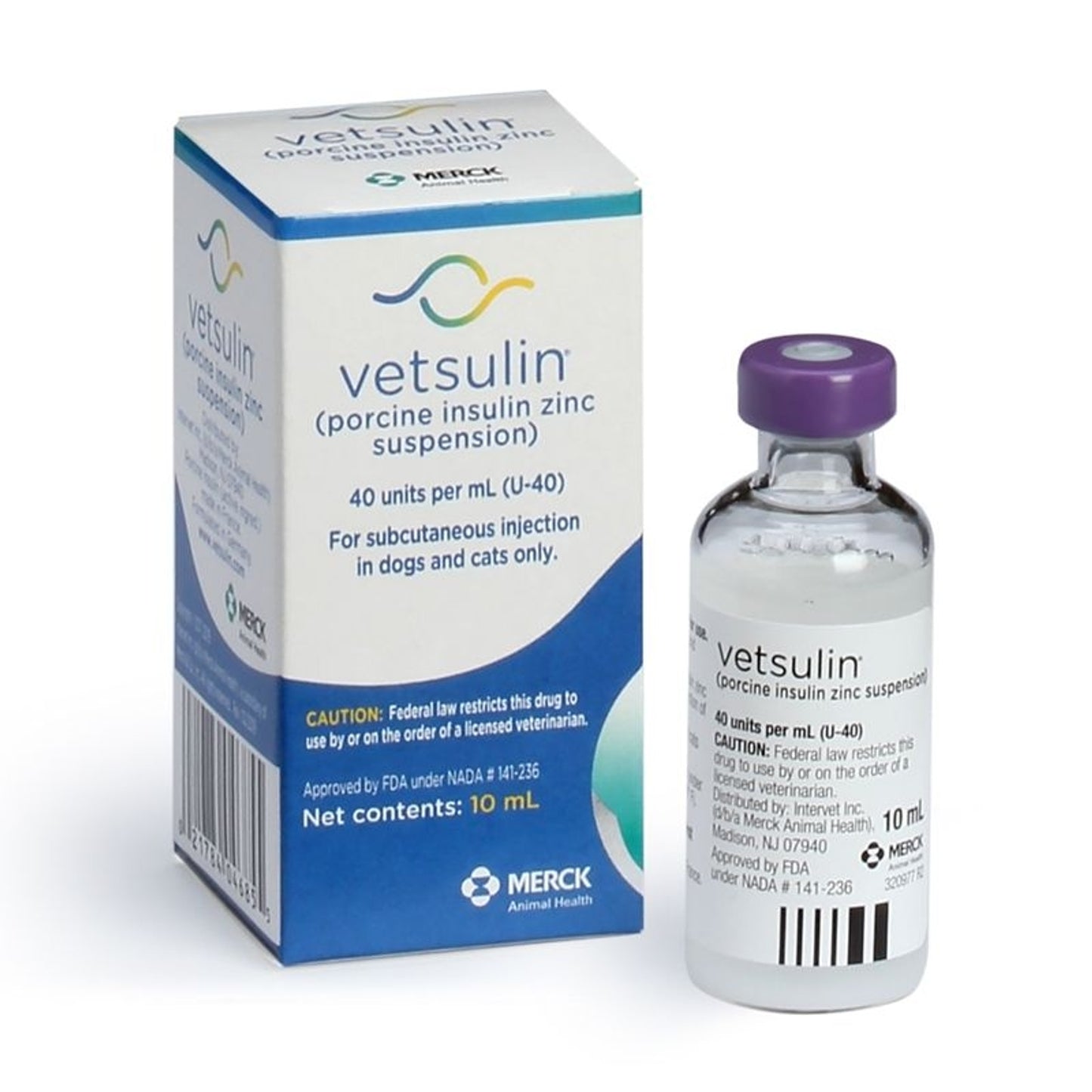1
/
of
1
Merck
Vetsulin Insulin U-40 10ml
Vetsulin Insulin U-40 10ml
Regular price
$74.99
Regular price
$74.99
Sale price
$74.99
Unit price
/
per
Sale
Sold out
Couldn't load pickup availability
Usually Ships in 1-2 business days
Oversize Fee: $0.00
This item not eligible for additional promotional discounts.
SKU:406375
Prescription items are NON-RETURNABLE and NON REFUNDABLE
This prescribed medication is shipped in a cooler with ice packs. Please note the ice packs may be melted by the time you receive your package, but they have done the job of protecting the medications during the shipment. Medications and time-sensitive items will be shipped Monday through Wednesday before 2:00 pm Eastern Time via 2-day service. If next day service is required please advise customer service and will have an extra charge. If the order was received after 2:00 pm Eastern Time on Thursday the order will ship out on Monday.
Vetsulin Insulin
Vetsulin (porcine insulin zinc suspension) is the only FDA-approved veterinary product for the management of diabetes mellitus in both dogs and cats. Vetsulin is indicated for the reduction of hyperglycemia and hyperglycemia-associated clinical signs in dogs and cats with diabetes mellitus.
Benefits:
As a lente insulin, Vetsulin is classified as intermediate-acting insulin. It is an aqueous suspension of 40 IU/mL of highly purified porcine insulin, consisting of 35% amorphous and 65% crystalline zinc insulin. Unlike human insulin, porcine insulin has the same amino acid sequence as canine insulin, making it less likely for dogs to develop anti-insulin antibodies.
For use:
Dogs & cats
Strength/Size:
U-40
Active ingredient(s):
porcine insulin zinc suspension
Cautions:
Vetsulin should not be used in dogs or cats known to have a systemic allergy to pork or pork products. Make sure to tell your veterinarian what other medication or supplements you are giving your pet. Dietary changes may also affect insulin requirements. Quite often your veterinarian may prescribe two different medications, even if a drug interaction may occur. In this case, your veterinarian may vary the dose and/or monitor your pet more closely. The following drug interactions that may occur with insulin include Beta-adrenergic blockers, clonidine, risperidone, and digitoxin. Drugs that may increase the hypoglycemic activity of insulin (resulting in low blood sugar) include captopril, enalapril, alcohol, anabolic steroids, beta-adrenergic blockers, MAOI's, guanethidine, phenylbutazone, sulfinpyrazone, sulfonamides, tetracycline, and aspirin, or other salicylates. Drugs that may decrease the hypoglycemic activity of insulin (resulting in high blood sugar) include epinephrine, estrogen/progesterone combinations, furosemide, glucocorticoids, isoniazid, phenothiazine derivatives, thiazide diuretics, and thyroid hormones. Serum potassium levels can fluctuate in combination with digoxin and insulin and additional monitoring may be needed. Contact your veterinarian if your pet experiences any unusual reactions when different medications are given together. Allergic reactions to medications may occur. Be sure to inform your veterinarian if your pet has any known drug sensitivities or allergies. If your pet displays symptoms of an allergic reaction, call your veterinarian immediately or go to a veterinary emergency clinic. Symptoms may include but are not limited to swollen lips, tongue, face, airways; difficulty breathing; agitation; profuse salivation; vomiting; widespread hives and itching.
Side effects:
Possible side effects of insulin therapy may include hypoglycemia. Signs include hunger, nervousness, vocalization, anxiety, muscle tremors, ataxia, and papillary dilation. If there are signs of hypoglycemia, offer the pet some food or oral dextrose. A positive response should occur within one to two minutes. Prolonged hyperglycemia can result in seizures, coma, and death. Severe hypoglycemic signs require prompt veterinary intervention. Other side effects may occur. If you notice anything unusual, contact your veterinarian.
Usage:
Vetsulin insulin should be administered as directed by your veterinarian. Your veterinarian will determine the correct dose of insulin need for your pet by means of a blood glucose test. Follow your veterinarian's instructions as doses may vary over time. Injections should be given subcutaneously, just under the skin. Be sure to rotate injection sites to prevent skin problems at the injection site. Pinch a fold in the skin to create a small space for the needle. Insert the needle into the center of the fold as instructed by the veterinarian. Inject the drug by pushing the plunger as far as it will go. Withdraw the needle and be careful to not stick yourself. Dispose of the needle immediately in a proper sharps disposal container.
Model Numbers and UPCs
Model Numbers and UPCs
| Style | Item Number | UPC |
|---|---|---|
| One Size | 406375 | 021784046855 |
Prop 65 Warning
Prop 65 Warning
⚠️ WARNING: This product can expose you to chemicals which is known to the State of California to cause cancer, birth defects or other reproductive harm. For more information, go to www.P65Warnings.ca.gov
Share


